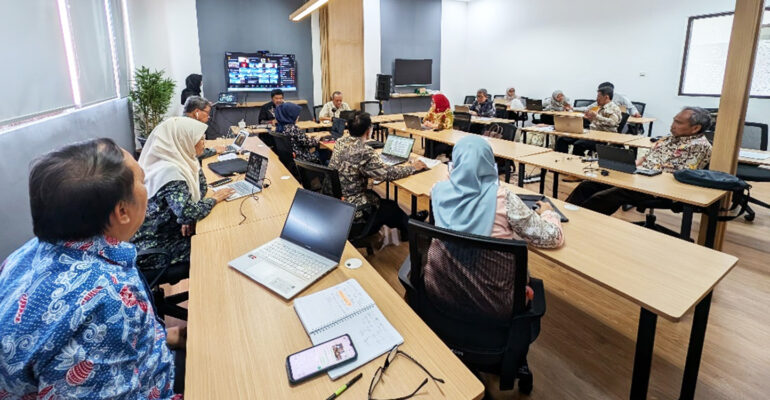IPB University through the International Research Institute for Environment and Climate Change (LRI-LPI) and the Center for Mining Reclamation Studies (Reklatam) held a scientific discussion called LRI TALK #1.
In this discussion, IPB University academics shared their views on post-mining land reclamation strategies so that they can be optimally utilized. The event was hosted directly by the Head of Reklatam, Prof. Suwardi and the Secretary of Reklatam, Ir. Hermanu Widjaja, MSc Agr.
IPB University’s Vice Chancellor for Research, Innovation, and Agromaritime Development, Prof. Ernan Rustiadi, in his remarks emphasized that post-mining land utilization is not only limited to environmental rehabilitation, but must also be directed to support the local economy.
“The transformation of ex-mining land can provide long-term benefits, both ecologically and socio-economically. With a science and technology-based approach, land that has been degraded due to mining can be restored to its function, even more productively than before,” he said.
Academician of the Faculty of Forestry and Environment (Fahutan) IPB, Dr. Irdika Mansur reviewed the importance of a forestry-based approach in mine reclamation. According to him, one of the biggest challenges in reclaiming mining land is selecting types of plants that can survive in land that has experienced extreme degradation.
He suggested an agroforestry model as a solution, which allows a combination of forestry plants and food crops in one reclamation ecosystem.
Meanwhile, Professor of Agrogeology IPB, Prof. Iskandar highlighted the impact of mining on soil quality. He explained that soil in ex-mining land often loses nutrients, experiences changes in physical structure, and is at risk of containing heavy metals that can be harmful to plants and human health.
Therefore, a soil rehabilitation strategy is needed using improvers such as lime, compost, and biochar so that the soil is fertile again and safe for agriculture.
In the same session, Prof. Budi Mulyanto, Professor of Soil Science and Land Resources IPB emphasized the regulatory aspect. The reason is, the current regulations still have overlapping authorities between the Ministry of Energy and Mineral Resources and the Ministry of Environment and Forestry (KLHK).
In addition, land ownership after post-mining is often a problem in itself, especially for people who want to reuse the land for agriculture and forestry.
According to Prof. Budi, the solution to this problem is harmonization of policies between various ministries and local governments.
“Regulations must be more flexible and support reclamation efforts that are not only carried out by mining companies, but also by local communities. If the government can provide legal certainty, the community will be more encouraged to participate in the utilization of ex-mining land,” he explained.
Innovation and Technology
Regarding innovation and technology in reclamation of ex-mining land, Prof. Suryo Wiyono, Dean of the Faculty of Agriculture, IPB discussed the role of microbes in improving soil quality in post-mining areas.
He explained that certain soil microbes can help increase soil fertility and reduce the content of heavy metals that are harmful to food crops.
“Microbes can function as natural biofertilizers that can increase plant resistance to extreme conditions. In addition, the use of microbes in the reclamation process is also more environmentally friendly compared to chemical methods,” said Prof. Suryo.
In addition to soil restoration, Prof. Sulistiono from the Department of Water Resources Management of IPB explained that former mining holes filled with water can be converted into freshwater fish farming ponds, such as tilapia and catfish. However, he reminded that the main challenge in utilizing former mining pits for fisheries is water quality.
“Some former mining locations have high heavy metal content, so they need to be processed first before they can be used as a fishery ecosystem,” he explained.
Meanwhile, Ir. Murdianto, MS emphasized that the socio-economic aspects of reclamation of former mining land must also be a primary concern. The involvement of local communities in the reclamation process can have a broader impact on sustainable development.
“Reclamation is not only limited to improving environmental conditions, but must also provide added value to the surrounding community. If the community is empowered in managing reclaimed land, reclamation will be more sustainable and provide real economic impacts,” said the lecturer at the Faculty of Human Ecology, IPB.
In closing, the Head of LRI-LPI IPB University, Prof. Rizaldi Boer, emphasized that efforts to reclaim ex-mining land must be a shared agenda. A multidisciplinary approach is needed to ensure that reclamation runs effectively and sustainably.
“We hope this discussion will be the beginning of closer collaboration in creating innovations and policies that support the utilization of ex-mining land. This land transformation is not only aimed at restoring the ecosystem, but also to create added value for the community,” said Prof. Rizaldi.
He also emphasized that LRI-LPI IPB University will continue to encourage research and innovation in the field of mine reclamation, including the development of more environmentally friendly technologies and more adaptive policies.

